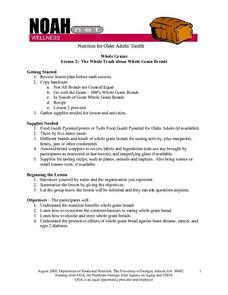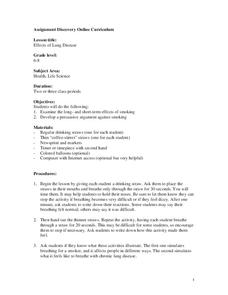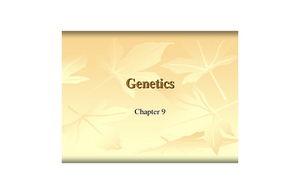Teach Engineering
The Mighty Heart
Have your class follow the step-by-step directions in this resource to dissect a sheep heart and gain a better understanding of this amazing organ. Working in small groups, pupils look for specific parts of the heart during their...
NOAA
Microfriends
Is there medicine found in the organisms that live deep below the surface of the ocean? The fifth lesson in a six-part series has learners team up to research bacteria and the relationship it has with nearly every living thing on Earth....
Centers for Disease Control and Prevention
Equality in Smoking and Disease—Nobody Wins!
Fifty years ago, women were much less likely to die from smoking-related ailments than men. But thanks to targeted advertisements for and a wider availability of tobacco products, men and women are now equally susceptible to...
Baylor College
Heart Rate and Exercise
Teach your exercise enthusiasts to read their pulse rate at the radial artery and multiply by four to calculate beats per minute. Learners perform a variety of activities, recording their heart rates after one minute of each. Though...
Baylor College
The Heart is a Pump
Circulate this news: the heart is a pump containing one-way valves! Following the previous lesson on the external structure of the heart, learners now take a look at the inside. They use a three-color diagram to label a black-and-white...
Baylor College
What is Blood Pressure?
Find out how we describe the force created by the blood against the walls of the vessels in a heart-pumping lesson! As part of a unit on the heart and circulatory system, cardiology kids use a blood pressure monitor to find their...
Curated OER
The Strongest Pump of All
Learners examine how the heart functions and the concept of how electrical currents can affect muscle contractions. In this cardiovascular lesson students identify P, QRS and T complexes.
NOAA
Watch the Screen!
Can a sponge cure cancer? Life science pupils visit the drugstore under the sea in the fifth instructional activity of six. Working groups research the topic then get hands-on experience by testing the inhibiting effects of several...
Curated OER
Are You Susceptible?
Students play a game to explore the relationship between genetic variation and environmental factors in the onset of heart disease. They consider the implications for disease prevention of increased knowledge about genetic variation.
Curated OER
The Whole Trut about Whole Grain Breads
Students comprehend the nutrition benefits whole grain breads. They explore how to overcome the common barriers to eating whole grain bread. Students investigate how to choose and store whole grain breads. They comprehend the...
Curated OER
Science In Society
Fifth graders study diseases that are related to the use of alcohol, tobacco, and drugs, both prescription and illegal. They determine illnesses that can occur as a direct result of the use of or inappropriate use of these substances....
Curated OER
Biology E3 Project Instructional Plan
Ninth graders design a device to treat aneurism. In this biology lesson, 9th graders create a polymer in the lab and explain its uses. They identify the different diseases affecting the circulatory system.
Curated OER
Effects of Lung Disease
Students illustrate the chronic lung conditions associated with smoking and write a persuasive argument against smoking. In this lung disease lesson, students use straws and balloons to illustrate the problems created by smoking. They...
Curated OER
Fast Fats: A Nutritional Analysis of America's Obsession with Fast Foods
How do you read a nutritional label? Help high schoolers practice reading nutritional labels on foods so they can calculate the calories in different types of foods. They will also examine the effects of fat on the body and the link to...
Teach Engineering
Model Heart Valves
Small groups use the knowledge learned about the heart to design and build a prototype of an artificial heart valve. The teams demonstrate the functionality of their valve. They are also responsible for creating a pamphlet that describes...
Curated OER
5 A Day The Color Way
Students explore the ways they can incorporate fruits and vegetables into their diets. In this health lesson students and parents list health benefits of more fruits and vegetables in their diets and complete a handout.
Curated OER
Weight Training: Lifetime Fitness
Students research the relationship between physical activity and the prevention of illness, disease and premature death. Students understand that working out regularly will increase muscular strength, endurance and improve many areas of...
Curated OER
Heart Message- Write the Word That Completes the Sentence
In this heart health fill in the blank worksheet, student use words from a word bank to complete sentences about heart health. They take a circled letter from each word to make a new word that is a "heart message."
Curated OER
Death by Particles
Emerging epidemiologists define relative risk and read an article about the effect of particulate pollution on the cardiovascular health of women. They record the relative risk values, graph them, and answer analysis questions. This is a...
Curated OER
Genetics
Students create a checklist of traits common in all of their families. Uisng a table, they compare and contrast their family members to non-family members. They also review dominant and recessive traits and discuss how knowing about...
Curated OER
Activity Log- Heart Power
In this health and fitness activity, students keep a detailed log on this blank chart. Students record all their fitness activities for a week and indicate if they are aerobic or anaerobic.
Curated OER
Bittersweet: Diabetes
Students study diabetes including the warning signs and preventive measures. In this insulin lesson students complete several activities that examine the different types of diabetes.
Curated OER
Phytochemicals
Students study what phytochemicals are, how they work and where you can find them. In this food chemicals lesson students complete and activity and study products that contain phytochemicals.
Curated OER
Compare and Contrast Type 1 and Type 2 Diabetes
Young scholars use graphic organizers to compare and contrast Type 1 and Type 2 diabetes. In this diabetes lesson, students are given information on the two major types of diabetes. They analyze how to compare and contrast the information.

























